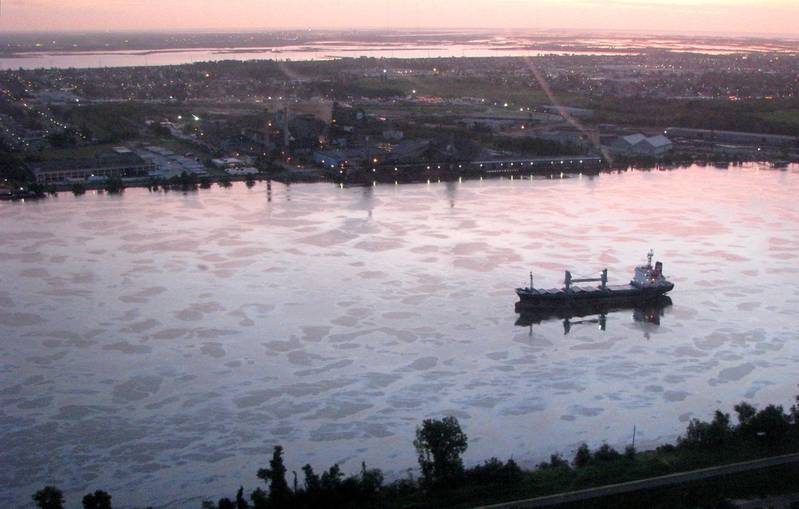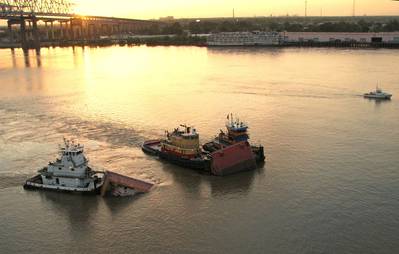ACBL to Pay Over $2 Million for Mississippi River Oil Spill
Jeffersonville, Ind.-based barging company American Commercial Barge Line (ACBL) has agreed to acquire and preserve 649 acres of woodland wildlife habitat and will pay an additional $2 million for damages stemming from a 2008 oil spill on the Mississippi River, near New Orleans.
The company has already paid $1.32 million to reimburse the federal and state trustees for their past damage assessment and restoration planning costs after one of its barges discharged approximately 6,734 barrels (282,828 gallons) of No. 6 fuel oil into the Mississippi River upriver of New Orleans in July 2008. In an earlier related Oil Pollution Act (OPA) enforcement action filed in 2011, the Department of Justice secured a settlement with ACBL for $20 million to reimburse the U.S. for removal costs and damages.
The U.S. and Louisiana concurrently filed a civil complaint with a proposed consent decree seeking damages and costs under for injuries to natural resources. The complaint alleges that the spill resulted from a collision that occurred when the ACBL tug Mel Oliver, which was pushing a barge upriver, veered directly in front of the Tintomara, an oceangoing tanker sailing downriver. The oil spill spread more than 100 miles downriver and covered over 5,000 acres of shoreline habitat. The oil spill caused significant impact and injuries to aquatic habitats within the Mississippi River and along its shoreline, as well as to birds and other wildlife. The oil spill forced the closure of the river from River Mile Marker 98 (just upriver from New Orleans) to the Southwest Pass Sea Buoy, from July 23, 2008 until July 29, 2008. ACBL, the Coast Guard and the state were involved in extensive response and cleanup efforts, and ACBL has cooperated with the federal and state trustees in the assessment of injuries to natural resources.
 (Photo: Chris Lippert / U.S. Coast Guard)
(Photo: Chris Lippert / U.S. Coast Guard)
Under the proposed consent decree, ACBL will acquire (at an estimated purchase price of $3.25 million) and preserve 649 acres of woodland habitat, consisting of hardwood forested wetland, swamp, relic wetlands and open waters (i.e., canals), near the Mississippi River in upper Plaquemines Parish, La. The Woodlands Conservancy, a local nonprofit that currently manages the property for recreational and educational use, will hold title to the property and a conservation servitude will forever limit the use of the Woodlands Parcel to passive recreation, thereby protecting and preserving the ecological benefits of the property.
ACBL will also pay $2.07 million to compensate for natural resource damages from the spill. The federal and state trustees will jointly use the cash payment to perform projects to restore or ameliorate the impacts to aquatic life, birds, river batture, wetlands, marshes and recreational uses along the Mississippi River. The projects include habitat restoration activities at the Woodlands Parcel and marsh creation in the Pass-a-Loutre State Wildlife Management Area.
“This settlement secures full compensation for the damaged resources, including the permanent preservation of 649 acres of critical wildlife habitat along the Mississippi River just a few miles from downtown New Orleans,” said Assistant Attorney General Todd Kim for the Justice Department’s Environment and Natural Resources Division. “The restoration projects funded by this settlement will restore wildlife and wetlands, and enhance recreational opportunities for Louisiana’s residents and visitors.”
“Safeguarding the environment is one of the highest priorities for the Department of Justice,” said U.S. Attorney Duane A. Evans for the Eastern District of Louisiana. “Ultimately, this case demonstrates the DOJ’s firm commitment, along with our federal and state partners, to utilize the full panoply of legal remedies available to protect and remediate vital water sources and the diverse ecosystems found in southeastern Louisiana.”
“Local communities and economies in Louisiana depend on the Mississippi River and the vibrant ecosystems it supports,” said Director Nicole LeBoeuf of NOAA's National Ocean Service. “We are pleased to join with industry and our co-trustees to restore vital habitats, wildlife, and outdoor recreational areas injured by the oil spill, and look forward to working with the public to implement restoration projects.”
“The wildlife resources and outdoor recreation opportunities of the lower Mississippi are critical to Louisiana’s rich natural heritage,” said Regional Director Leopoldo Miranda-Castro of the U.S. Fish and Wildlife Service’s South Atlantic-Gulf & Mississippi-Basin Regional Office. This settlement will allow for the restoration of lost resources and services and will facilitate locally-driven conservation and management that ensures equitable access to the connected local communities.”
The action was filed by the Department of Justice and the Louisiana Oil Spill Coordinator’s Office, Department of Public Safety & Corrections (LOSCO) on behalf of the federal and State trustees for natural resources.














